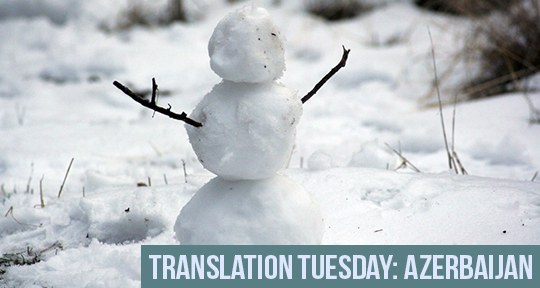For this week’s Translation Tuesday, we present to you a short story by decorated Azerbaijani author Nermin Kamal, translated from the Azerbaijani by Anne Thompson-Ahmadova. In it, a man and a woman—both married, but not to each other—commiserate about their respective marital woes. His wife can’t seem to recover from grief; her husband is lost in the interminable throes of depression. Meanwhile, the machinery of the city churns on. As the couple take solace in their clandestine connection, the man’s wife finds her own comfort in an unexpected animal visitor. Kamal playfully jumps between various perspectives among the city’s residents to depict their entanglements with a broad vision.
Late one afternoon a man and woman were sitting talking in George Enescu Park in the Eighth Residential District. ‘Cover your ears. Don’t listen to them,’ an old street vendor on a nearby bench told her granddaughter. The man was complaining about his wife and the woman about her husband. Tedious though the conversation was, they were listening intently to each other.
‘How long can this go on? How much longer can we live like this?’ the man grumbled. ‘I come home exhausted from work and find her sitting there crying. She put her father’s pictures on the wall and I didn’t say a word. Now she’s wearing her father’s clothes. I tell her, you shouldn’t keep a dead man’s clothes in the house, take them to the charity. Your father was a big strapping bloke, you’re a petite woman, how can you wear the dead man’s jumper in front of your husband? But does she listen? She’s been crying for six months. I could understand it then—her father had just died, but what can I say to her now?’
‘Mine’s the same,’ the woman grumbled. ‘The house is falling apart. All the cupboard doors are hanging off their hinges. Whatever you touch, it’s broken. He doesn’t fix anything or get anyone else to fix things, he just sleeps all day. Not that his father has died. He says, I’m tired, really tired. You might be fed up of life—that’s up to you, but I’m not. Life is wonderful.’
Though he was just a statue, George Enescu couldn’t bear it. He swept his bow over the strings of his violin. When the man was speaking, the noble instrument growled like a bear, but when the woman was speaking it twittered incessantly like a nightingale. But no one except the violinist could hear it.
‘At least there’s a grave. We gave him a proper burial, laid flowers. I said to her, the world is heading for hell in a handcart. By the time we die we might envy those who are already dead!’


